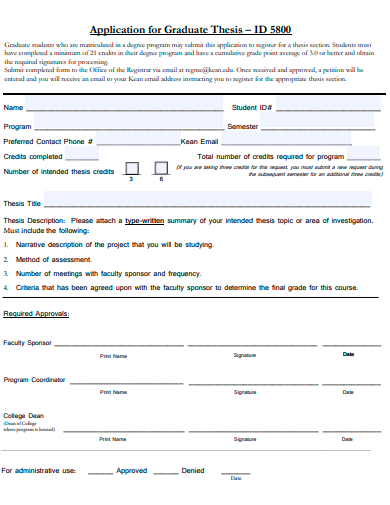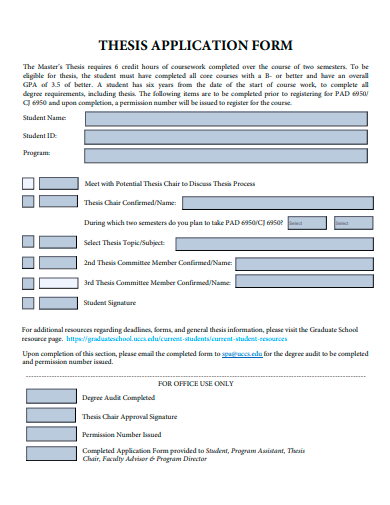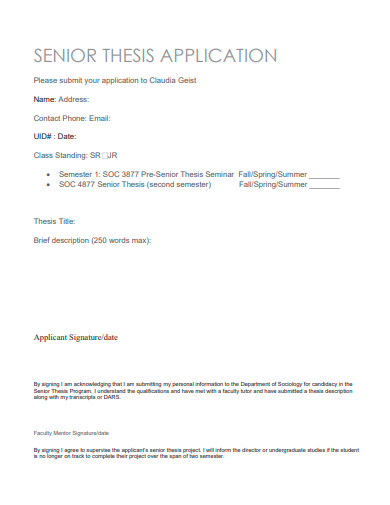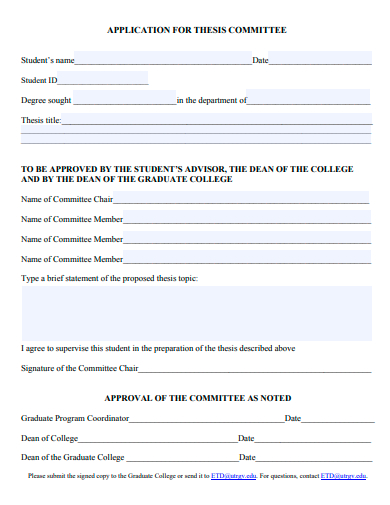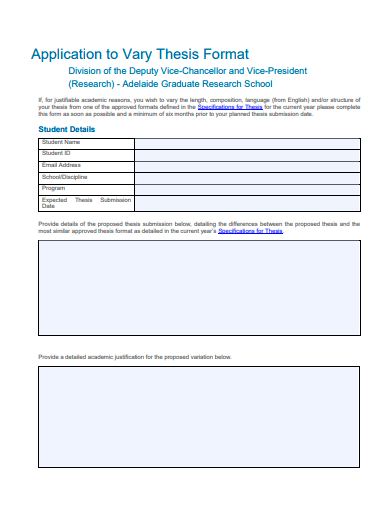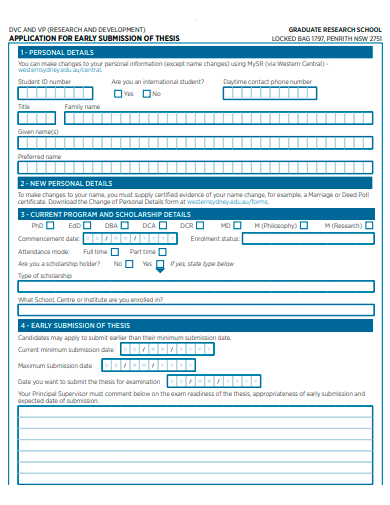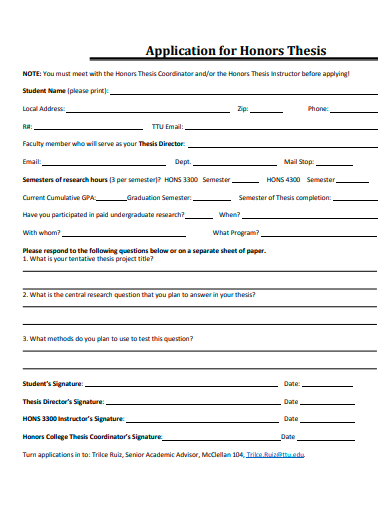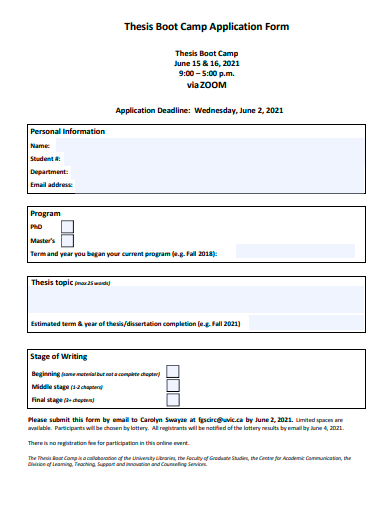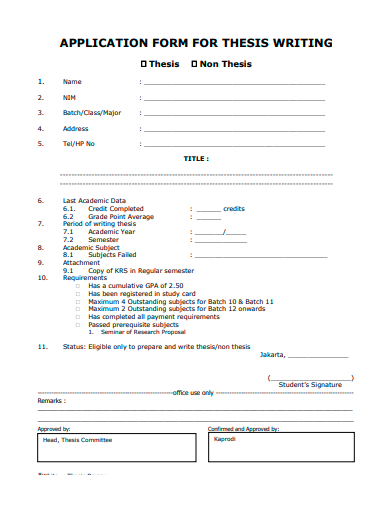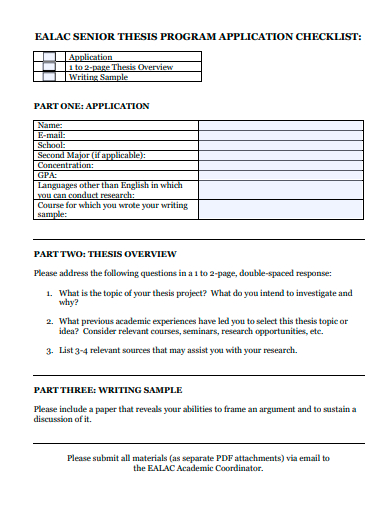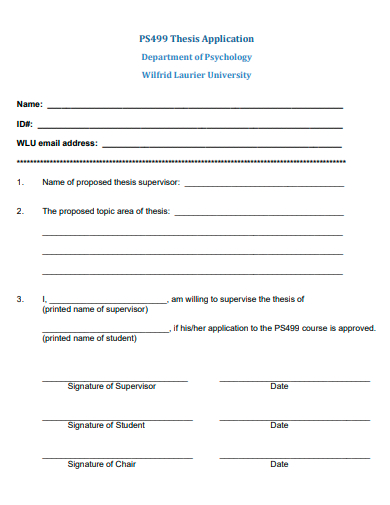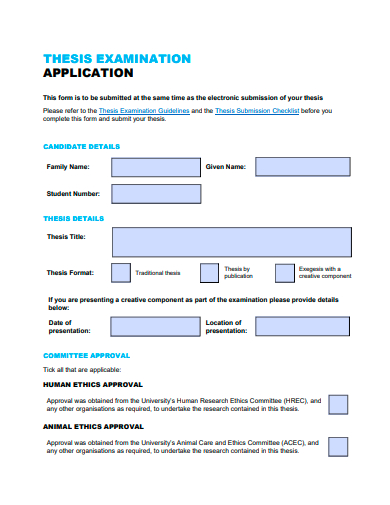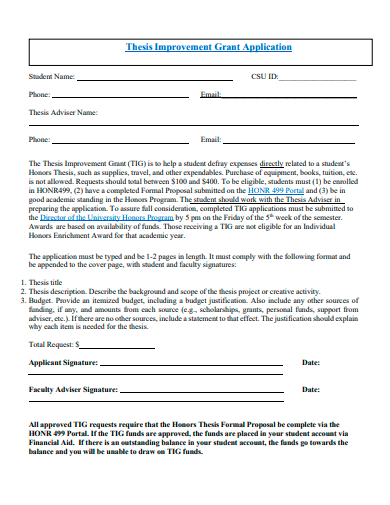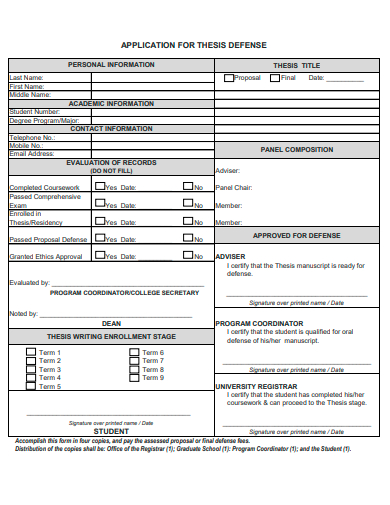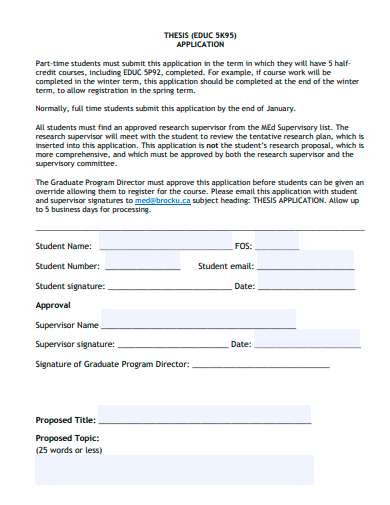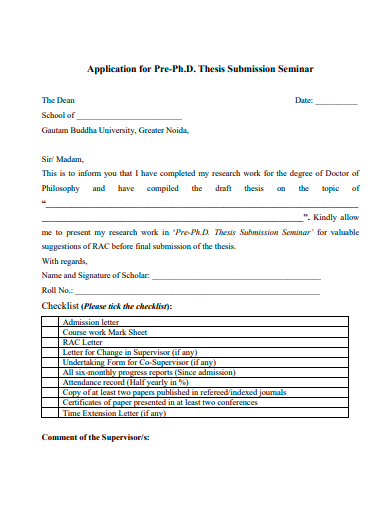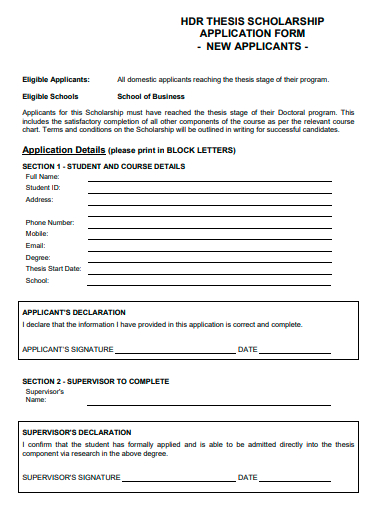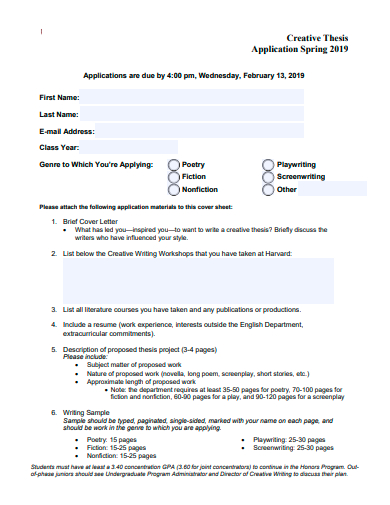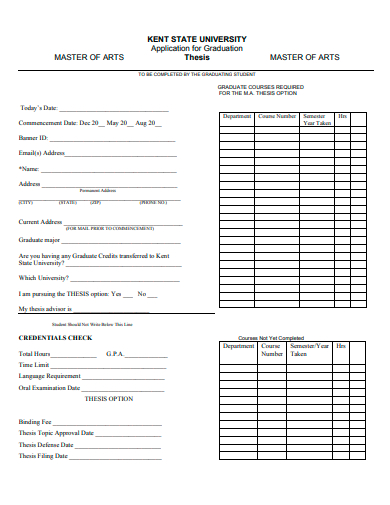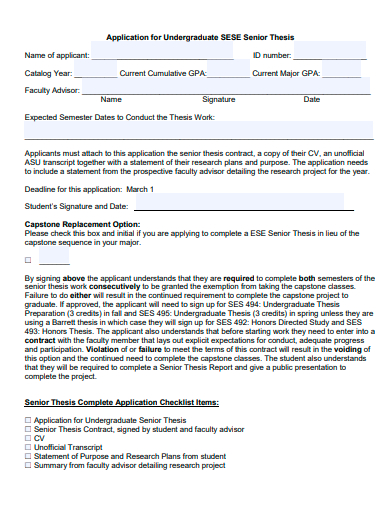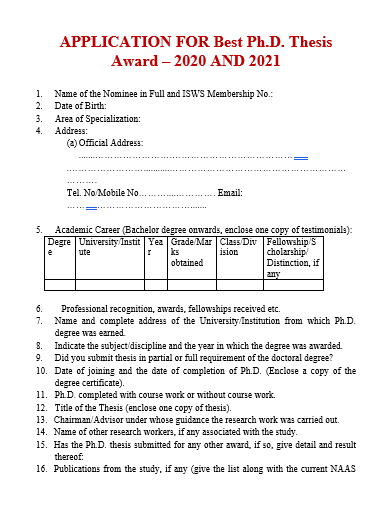Diving into academic research can be a daunting endeavor, but with the right tools, the journey becomes significantly smoother. Our Sample Thesis Application Template is designed to be that game-changer for ambitious scholars. Expertly crafted to streamline the research and documentation process, this application template stands as an indispensable asset for students aiming to produce top-notch theses. By incorporating key features aligned with academic standards, we’ve ensured that every student has a reliable roadmap to academic excellence.
20+ Thesis Application Samples
1. Graduate Thesis Application Template
2. Thesis Application Form Template
3. Senior Thesis Application Template
4. Thesis Committee Application Template
5. Thesis Application Format
6. Early Thesis Submission Application Template
7. Honors Thesis Application Template
What is a Thesis Application?
A thesis application, in many academic contexts, isn’t a term as commonly encountered as, say, a thesis proposal or thesis paper. However, within certain contexts, the phrase can have distinct meanings. Generally, it can refer to either software tools specifically designed to aid in the creation and organization of theses or a formal application process to undertake a thesis. Let’s delve into both interpretations:
1. Thesis Application Software:
With the digitalization of education, various software tools, often referred to as thesis applications, have been developed to assist students and researchers in their academic writing pursuits.
- Organization: Thesis writing involves extensive research, and managing sources can be challenging. Applications often include features that help organize these sources, making referencing and citation easier.
- Templates: These applications often provide pre-formatted templates that adhere to common academic standards, ensuring that the thesis meets institutional requirements without the writer having to fret about formatting minutiae.
- Collaboration: In instances where theses are collaborative efforts, these tools may offer features that enable real-time co-editing, feedback incorporation, and seamless communication between team members.
- Plagiarism Check: Given the importance of originality in academic research, some thesis applications include built-in plagiarism checkers to ensure the content’s uniqueness.
- Backup and Cloud Storage: Losing months of work is a researcher’s nightmare. Many applications include auto-save features and cloud storage, ensuring that the work is safe from technical glitches.
2. Formal Application to Undertake a Thesis:
In some academic institutions or programs, before embarking on the thesis journey, students might be required to submit a formal “thesis application” to their department or advisory committee.
- Proposal Submission: This is typically the centerpiece of the application. It outlines the intended research topic, objectives, methodology, preliminary bibliography, and the significance of the study. This proposal helps the committee assess the viability of the topic and the student’s preparedness.
- Advisor/Supervisor Selection: The application might also entail selecting or being assigned an advisor or supervisor. This faculty member will guide the student through the thesis process, offering feedback, insights, and expertise.
- Eligibility: The thesis application can be a checkpoint for ensuring the student meets specific criteria, be it coursework completion, a particular GPA, or prerequisite projects.
- Timelines and Milestones: The application might also require students to provide a tentative timeline, setting out when they anticipate reaching certain milestones in their research and writing.
Thesis application can pertain to the tools we use in the modern digital age to facilitate the challenging process of thesis writing or the formal bureaucratic process of seeking approval to embark on such a scholarly journey. In both interpretations, the focus remains the same: ensuring that the student or researcher is equipped and prepared to produce rigorous, high-quality academic work. Whether you’re seeking a tool to aid your writing or preparing to submit your application, understanding the requirements and features of each will be crucial to your academic success.
8. Thesis Camp Application Form Template
9. Thesis Writing Application Form Template
10. Senior Thesis Program Application Checklist Template
11. Sample Thesis Application Template
12. Thesis Examination Application Template
13. Thesis Improvement Grant Application Template
14. Thesis Defense Application Template
15. Thesis Application Template
What is a Template for a Thesis Statement?
A thesis statement is a concise, clear summary of the main point or claim of an essay or research paper. It’s arguably the most crucial sentence in any academic paper because it sets the tone, direction, and focus for the entire work. Given its significance, many students and writers rely on templates to craft a compelling thesis statement. Let’s delve into the nature, purpose, and structure of such templates.
Purpose of a Thesis Statement Template:
A template serves as a guide or framework that offers a structured approach to crafting a thesis statement. It’s particularly beneficial for:
Beginners: Those new to academic writing can benefit immensely from a template as it offers a clear pathway to drafting a focused thesis.
Clarity and Precision: A template can help ensure the thesis statement is clear and directly addresses the essay or paper’s main point.
Consistency: Using a template can bring consistency across different essays or papers, especially when one is working on multiple pieces simultaneously.
Basic Structure of a Thesis Statement Template:
A simple template might look something like this:
[Subject] is [specific claim] because [reason 1], [reason 2], and [reason 3].
For example:
Climate change is a pressing global issue because of increasing global temperatures, rising sea levels, and the frequent occurrence of extreme weather events.
Expanding on the Structure:
Subject: This is the main topic or focus of your essay or research paper. In the example above, the subject is climate change.
Specific Claim: This is your particular stance or perspective on the subject. In our example, the claim is that climate change is a pressing global issue.
Reasons: These are the primary points or evidence you will use to support your claim. The reasons should be broad enough that you can delve into each one in separate sections or paragraphs of your essay. In the sample thesis, the reasons provided include increasing global temperatures, rising sea levels, and frequent occurrence of extreme weather events.
Flexibility and Adaptation:
While the template provided is a basic one, thesis statement templates can and should be adapted based on the complexity of the topic, the length of the essay, and the specific requirements of the assignment. Some essays might require a comparative thesis statement, while others might need a cause-and-effect statement. The template should be viewed as a starting point, not a rigid formula.
A template for a thesis statement serves as a beacon, illuminating the path for writers to draft focused, clear, and compelling theses. By offering a structured approach, it helps writers articulate their main points and supporting arguments effectively. However, always remember that while templates are useful tools, they should be adapted to fit the nuances and intricacies of each specific essay or research paper. The key lies in understanding the essence of the template and molding it to articulate your unique perspective and insights on the topic at hand.
16. Thesis Submission Seminar Application Template
17. Thesis Scholarship Application Form Template
18. Creative Thesis Application Template
19. Master of Arts Thesis Application Template
20. Undergraduate Senior Thesis Application Template
21. Thesis Award Application Template
The 5 Components of a Thesis
A thesis, especially in the context of higher-level academic work such as a Master’s or Ph.D. dissertation, is a comprehensive document that presents an author’s research and findings. The purpose of a thesis is to demonstrate the author’s ability to conduct original research that contributes significantly to their field of study. While the structure can vary depending on the academic discipline, country, or institution, there are five fundamental components of a thesis:
1. Introduction:
Purpose and Significance: The introduction lays the groundwork for the readers, presenting the research question or problem statement and explaining its significance in the broader field of study.
Background Information: This provides relevant context, such as a brief overview of existing research on the topic, to help readers understand the foundation upon which the study is based.
Thesis Statement: This is a concise summary of the main point or claim of the research. It serves as a roadmap, indicating what the study aims to prove or elucidate.
2. Literature Review:
Survey of Existing Research: This section offers a detailed review of the primary research and publications related to the topic. It establishes the current state of knowledge and identifies gaps or inconsistencies in previous studies.
Positioning the Research: By reviewing the literature, the author demonstrates their familiarity with the major works in the field and positions their research in relation to these works, highlighting its importance.
3. Methodology:
Research Design: This section outlines how the research was conducted. It describes the methods and techniques used, such as experiments, surveys, or qualitative interviews.
Data Collection and Analysis: The author explains how data was gathered and the tools or methods used to analyze it.
Justification: It’s crucial to explain and justify why particular methods were chosen over others and how these methods address the research question or problem.
4. Results and Discussion:
Presentation of Findings: This section provides a detailed account of what was discovered through the research. It may include charts, graphs, and other visual aids to help communicate the findings.
Interpretation: Beyond just presenting the results, the author must interpret and analyze them, drawing connections to the research question and the literature review. This section often delves into the implications of the findings, their limitations, and their relevance to the field.
5. Conclusion:
Summary: The conclusion revisits the main points of the thesis, summarizing the research, methods, and primary findings.
Implications: The author discusses the broader implications of their findings for the academic community, potential practical applications, and the field at large.
Recommendations for Future Research: Most research uncovers more questions than it answers. The conclusion often suggests areas for future studies or different approaches that could be taken.
In Summation:
A thesis is a meticulous and structured document that follows a logical progression, from introducing the research question to concluding with its implications. Each of the five primary components serves a distinct purpose, ensuring the research is presented clearly, comprehensively, and convincingly. It is essential to remember that while these components provide a general framework, specific requirements may vary based on discipline, institution, or country. Always consult with advisors or institutional guidelines when embarking on thesis writing.
Related Posts
FREE 29+ Student Application Form Samples in PDF | MS Word
FREE 21+ Administrative Application Samples in MS Word | Apple Pages | PDF
FREE 21+ Teacher Application Samples in MS Word | Apple Pages | Outlook | PDF
FREE 25+ Transfer Application Samples in MS Word | Apple Pages | PDF
FREE 23+ Participation Application Samples in MS Word | PDF
FREE 14+ Patient Application Samples in MS Word | PDF
FREE 21+ Eligibility Application Samples in PDF
FREE 20+ Travel Application Samples in PDF | MS Word
FREE 25+ Sponsor Application Sampales in MS Word | Google Docs | Apple Pages | PDF
FREE 23+ Candidate Application Samples in PDF
FREE 33+ Committee Application Samples in PDF | MS Word
FREE 37+ Supplemental Application Samples in PDF | MS Word
FREE 37+ Product Application Samples in PDF | MS Word
FREE 33+ Visiting Application Samples in PDF | MS Word
FREE 34+ Refund Application Samples in PDF | MS Word

